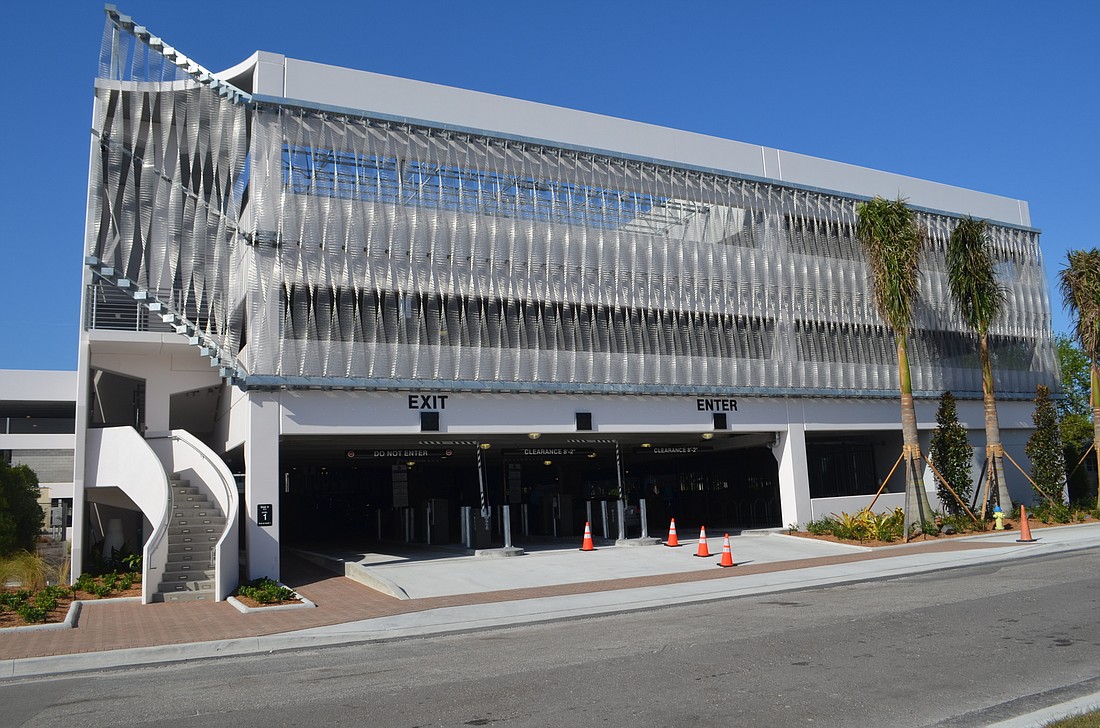- July 26, 2024
-
-
Loading

Loading

Is spending $493,000 to replace one of two chiller machines at Van Wezel Performing Arts Hall an essential duty of the city of Sarasota?
That was a point of contention at Monday’s City Commission meeting, highlighted in a dispute between Commissioner Hagen Brody and City Manager Tom Barwin regarding city financial priorities during the initial response to COVID-19.
Brody was critical of several spending items on the consent agenda for Monday’s meeting, stating his belief the city should be focused primarily on responding to the coronavirus. Barwin pushed back, saying Brody’s comments minimized the importance of preventing possible degradation of a city facility.
“He either doesn’t understand what we’re doing in the city or is grossly misrepresenting it,” Barwin said. “Even though we are in a public health emergency, we still have some basic responsibilities we have to attend to.”
Brody, however, stood by his critique of Barwin.
“We sit here today not even knowing if there’s going to be a season for the Van Wezel next year, and we’re talking about spending $500,000 on a backup water chiller,” Brody said.
The commission ultimately voted not to take action on all but one item on Monday’s consent agenda, pushing off a decision on more than $3 million in potential spending until the May 4 meeting. That included the purchase of the chiller, which would have been funded with revenue generated at the Van Wezel.
Although the commission might ultimately authorize the expenditures, the debate highlighted a challenge for the city, and for other local governments, for the foreseeable future.
How will officials account for the effects COVID-19 will have on their budgets? And how do they balance the need to provide services and maintain infrastructure with the need for immediate spending cuts — and, in all likelihood, significant expenditure reductions extending into the next fiscal year?
The city has already begun the process of addressing the short-term budget issues. On Monday, Barwin shared a memo with commissioners outlining revised financial projections for fiscal year 2020. The memo focuses on six funds staff believes will be most affected by declining income.
In addition to the general fund and the parks and recreation district, the memo includes enterprise funds that can no longer generate user-fee income included in the original budget. That includes two parking funds and the Bobby Jones Golf Club fund.
The city’s initial projections show a newly created shortfall of nearly $4.3 million, which staff intends to offset with $4.4 million in identified expenditure reductions.
The city’s models show a decrease of $1.85 million in general fund revenue. That is attributable largely to forecasted declines in income from three major sources: the electricity excise tax, sales taxes and electricity franchise fees. The memo states the projections include “the assumption there could be a reduction of 25% over a four-month period for several major revenue sources.” It also acknowledges that the projections might change as more information about the economic effects of COVID-19 become available.
The city did not make a staff member available for an interview on the process of updating budget projections. At an April 6 workshop and the April 20 meeting, Barwin said municipal budgets typically bear less of an immediate burden during an economic downturn, but the effects could linger longer than they do for private businesses.
“We’re redoing the whole budget for next year, anticipating that this will continue for a while,” Barwin said April 20. “The comeback will be slow and graduated.”
The effects of the previous recession lasted nearly a decade: general-fund property-tax revenue declined from $22.3 million in fiscal year 2008 to $16 million in 2012, recovering to predownturn levels in 2017.
The city does not anticipate taking a major short-term hit in ad valorem tax revenue because of COVID-19. According to the April 20 memo, the city has already received $32.3 million of the $35.3 million budgeted in property tax revenue, and the staff still projects it will collect a majority of the outstanding income.
Kelly Strickland, the city’s finance director, said it is difficult to confidently make projections because so much remains unknown. Already, however, she anticipated shortcomings for some funds will likely continue to place increased strain on the general fund into the next budget.
“What we’re looking at next year are probably going to be higher subsidies to our enterprise funds in fiscal year 2021,” Strickland said April 6.
That could have a unique impact on the St. Armands parking fund. The city anticipates that fund will need a general fund subsidy of $470,000 to maintain the existing fund balance of $75,719. But when the city authorized a bond to construct a parking garage for St. Armands Circle in 2017, it committed to using revenue generated by paid parking in the area.
As a result, any excess revenues from the parking fund in the future — which St. Armands stakeholders hoped would be invested into improvements in the area — will be required to first pay back any general fund subsidies. The language in the bond also requires the city to take action to increase St. Armands parking revenues if income isn’t sufficient to make debt service payments for the garage.
Barwin said staff would follow the direction of the commission when it comes to short-term spending. Still, he reiterated his belief there are still core duties the city needs to continue to carry out even during a state of emergency.
“We do have an organization to run,” Barwin said.
This article has been updated to clarify the proposed funding source for the purchase of a chiller at Van Wezel Performing Arts Hall.